Blockchain nodes are an essential component of blockchain technology, as they serve as the backbone that supports each and every function; from transaction verification to data storage, as well as the entirety of communication across a network.
However, operating a blockchain node is a complex endeavor, as it demands technical expertise and significant resources – i.e. complexities that can be difficult to manage for a single individual.
This is where professional blockchain node providers step in, which offer specialized services in managing the smooth functioning and scalability of blockchain networks for end users/clients.
In this article, we will explore the top 15 blockchain node providers in Web3 for 2024. These service providers are leading the blockchain node game in terms of their robust infrastructure, innovative solutions, unparalleled reliability, and user experience.
Key Takeaways
- Alchemy: Renowned for reliability, multi-chain support, and comprehensive developer tools. Noted for high performance but can be costly and centralized.
- AWS: Offers scalable enterprise solutions with strong security but has a complex pricing model and limited blockchain support.
- Infura: Popular with Ethereum users due to its high uptime and developer-friendly tools – though it has a history of outages and can be expensive.
- Moralis: Focuses on serverless infrastructure with comprehensive SDKs and APIs, particularly for NFTs and DeFi, but has a steeper learning curve.
- QuickNode: Known for speed and efficiency, supporting multiple chains with a user-friendly interface but can be expensive.
- Chainstack: Provides enterprise-level solutions with customizable nodes and global distribution but is complex and costly.
- GetBlock: Flexible pricing and extensive blockchain support with a user-friendly interface, but performance varies.
- Blockdaemon: Comprehensive support for over 60 networks with enterprise-grade security, suitable for institutions, however expensive and complex.
- ANKR: Decentralized infrastructure with extensive blockchain support and additional services like liquid staking, though performance can vary.
- Tatum: API-driven with multi-chain support, ideal for rapid development but less customizable and scalable.
- NowNodes: High uptime with customizable nodes and quick response, though advanced features are costly.
- Infstones: Ideal for Ethereum-focused projects, however costly.
- Pokt Network: Decentralized API layer with a unique governance model, suitable for DeFi projects, however complex.
- WatchData: Easy access to blockchain data with comprehensive support, however its limited features won’t appeal to advanced users.
- NodeReal: High performance with a comprehensive API suite, ideal for large-scale applications, however costly and complex.
What is a Blockchain Node Provider?
A blockchain node provider is a service or platform that offers infrastructure and support for running and maintaining blockchain nodes.
They often offer a range of services, including node deployment, monitoring, maintenance, and updates. They also provide users with the necessary tools and resources to easily set up and manage their blockchain nodes, saving them the hassle of configuring and maintaining the infrastructure themselves.
Now that we have a better understanding of blockchain node providers, let’s dive into the top 15 providers in Web3 for 2024:
Top 15 Blockchain Node Providers In 2024 – A Walkthrough
1. Alchemy
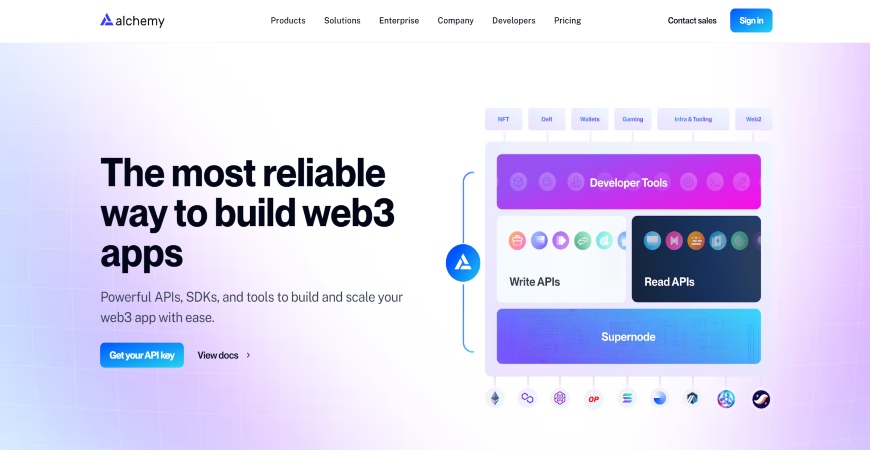
Alchemy is the world’s leading blockchain node provider, renowned for its high reliability and data accuracy. The company offers a suite of development tools and APIs, as well as a Web3 SDK and flexible pricing tiers that cater to different project scales, making it a versatile choice for developers and hobbyists alike.
Advantages
- High Reliability and Performance: Alchemy ensures high uptime and data accuracy with features like the Supernode, which enhances node performance and scalability.
- Comprehensive Developer Toolset: Offers a suite of developer tools such as Build, Monitor, and Notify, making it easier to develop, manage and scale applications.
- Multi-Chain Support: Supports multiple blockchains including Ethereum, Polygon, Arbitrum, Optimism, and Solana, providing flexibility for developers.
Disadvantages
- Cost: While Alchemy offers a generous free tier, advanced plans can become expensive, particularly for high-usage scenarios.
- Centralization: Being a centralized provider, it introduces some centralization risks, which don’t always align with the decentralized nature and appeal of blockchain technology.
Suitable For
- Developers and enterprises that need scalable solutions to build and maintain blockchain applications with minimal setup and maintenance effort.
- Projects requiring interoperability across different blockchain networks.
2. Amazon Web Services

AWS provides a comprehensive suite of tools for blockchain projects, including managed blockchain services that reduce the time and effort required to set up and manage networks.
AWS is known for its scalability and broad ecosystem, supporting various blockchain popular frameworks like Hyperledger Fabric and Ethereum.
Advantages
- Easy Deployment: AWS Managed Blockchain allows users to quickly set up and manage blockchain networks using familiar AWS management tools.
- Scalability: Users can scale their blockchain applications easily, adapting to changing demands.
- Security: Strong security measures, including AWS Key Management Service (KMS) for managing identities and encryption.
Disadvantages
- Complex Pricing: Its pricing model is complex and sometimes leads to escalating costs, depending on the usage and data transfer.
- Limited Blockchain Support: Currently supports Hyperledger Fabric and Ethereum, which isn’t necessarily sufficient for developers interested in various blockchain frameworks.
Suitable For
- Businesses looking for scalable, secure, and easy-to-deploy blockchain solutions.
- Current AWS clients who want to seamlessly integrate blockchain capabilities.
3. Infura
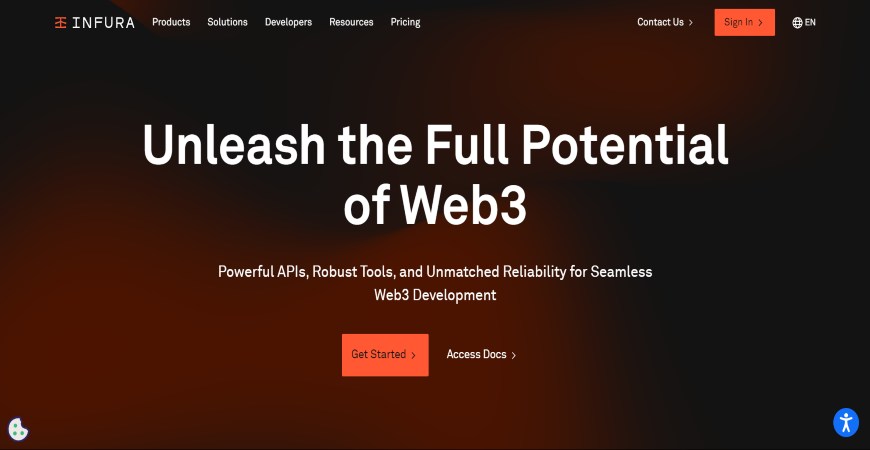
Infura – a subsidiary of ConsenSys – is arguably the most popular Ethereum node provider on the market. This is because it offers core node services with high reliability, speed, and throughput.
As a result, it is a popular choice for Web3 projects, as it also provides access to easy-to-use APIs, as well as integration with Consensys products.
Advantages
- Reliability: High uptime and stable access to Ethereum and other EVM-compatible networks.
- Developer-Friendly: Simplifies blockchain development with easy-to-use APIs and tools, making it accessible even for those with limited blockchain experience.
- Scalability: Can handle increased traffic and demand, making it suitable for both small and large-scale projects.
Disadvantages
- Outages: Has a history of occasional outages which can affect the performance of dependent applications.
- Cost: Paid plans are expensive, especially for extensive usage.
Suitable For
- Developers working within the Ethereum ecosystem.
- Small-scale projects like startups and small businesses that can benefit from its free services while scaling.
4. Moralis
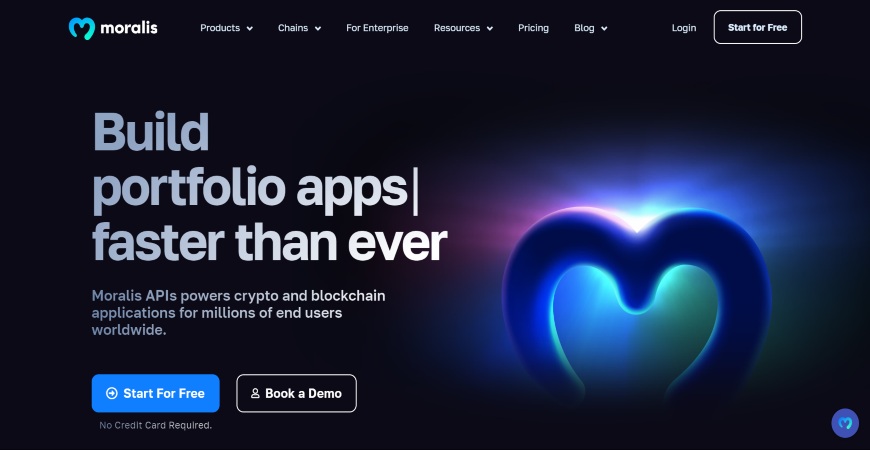
Moralis provides scalable Web3 infrastructures, with RPC nodes that promise speed and reliability. It also simplifies blockchain development with its server-less infrastructure, offering powerful SDKs and APIs for building decentralized applications (dApps), crypto tokens, wallets, and real-time data streams.
Advantages
- Server-less Infrastructure: Enables developers to build and manage applications without managing servers, therefore simplifying the development process.
- Comprehensive SDK and APIs: Provides a wide range of APIs and SDKs tailored for NFTs and DeFi projects.
- Multi-Chain Support: Supports multiple blockchains, enhancing the flexibility for developers.
Disadvantages
- Learning Curve: There is a steeper learning curve for developers that are new to server-less architectures.
- Cost: Advanced features and higher usage tiers are comparatively costly.
Suitable For
- Developers focusing on NFTs and DeFi.
- Projects that leverage a serverless architecture in order to reduce infrastructure management overheads.
5. QuickNode
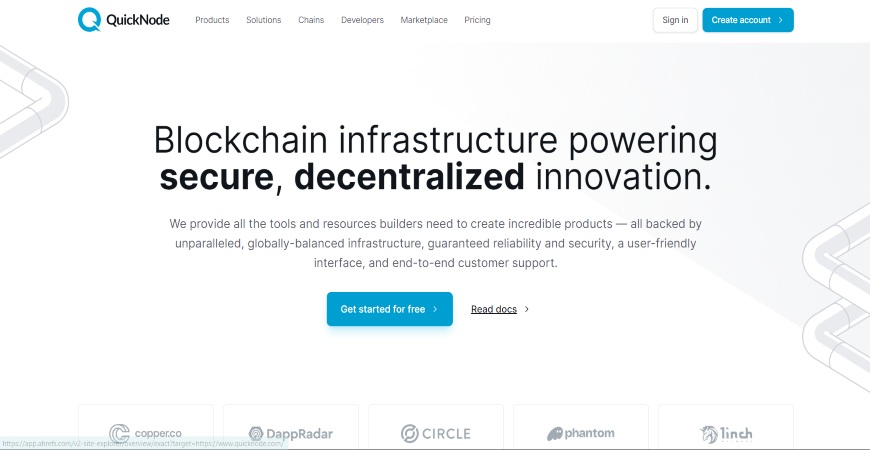
QuickNode stands out for its real-time data delivery and custom datasets. It offers a multi-chain platform with high API request handling capacity and guarantees 99.99% uptime.
Even better, QuickNode is game-ready and suitable for high-performance Web3 games and applications.
Advantages
- Speed and Efficiency: Provides rapid API responses and reliable node infrastructure, enhancing the performance of blockchain applications.
- Multi-Chain Support: Supports various blockchain networks including Ethereum, Bitcoin, and Solana, allowing developers to work across multiple ecosystems.
- User-Friendly: Features an intuitive dashboard and comprehensive documentation, making it easy for developers to integrate and manage their blockchain projects.
Disadvantages
- Cost: Services can be expensive for small projects or individual developers, especially for extensive usage plans.
- Centralization Concerns: Relying on a third-party service for blockchain infrastructure usually introduces centralization risks, counteracting the decentralized nature of blockchain technology.
Suitable For
- Developers and enterprises seeking a robust and scalable solution to build and maintain blockchain applications with minimal setup and maintenance effort.
- Projects that require interoperability across different blockchain networks, as it provides seamless integration and support.
6. Chainstack
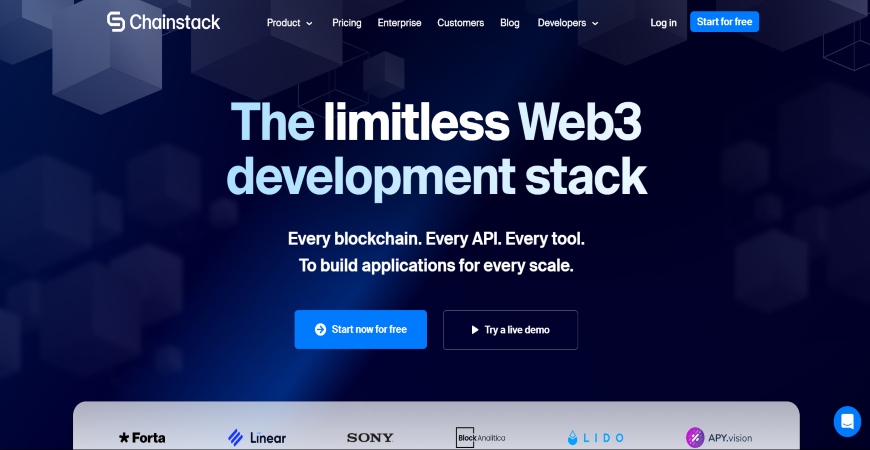
Chainstack prides itself on performance and reliability, sporting an enterprise-grade blockchain infrastructure that supports a wide range of networks, including Ethereum, Polygon, and Hyperledger Fabric. When it comes to the features on offer, the platform provides tools for node management, customizations, and global deployment, catering to all enterprise needs.
Advantages
- Enterprise-Level Solutions: Offers custom node parameters, low-latency nodes, and comprehensive support tailored for enterprise needs.
- Global Distribution: Nodes available in multiple geographic locations, enhancing accessibility and performance.
- Comprehensive Support: Provides extensive documentation, monitoring tools, and enterprise-level support.
Disadvantages
- Cost: Higher tiers are expensive, particularly for small developers or startups.
- Complexity: Is potentially difficult to set up and manage for those unfamiliar with enterprise-grade solutions.
Suitable For
- Businesses and institutions requiring high security, compliance, and custom blockchain solutions.
- Projects that need custom node parameters and optimizations for specific workloads.
7. GetBlock
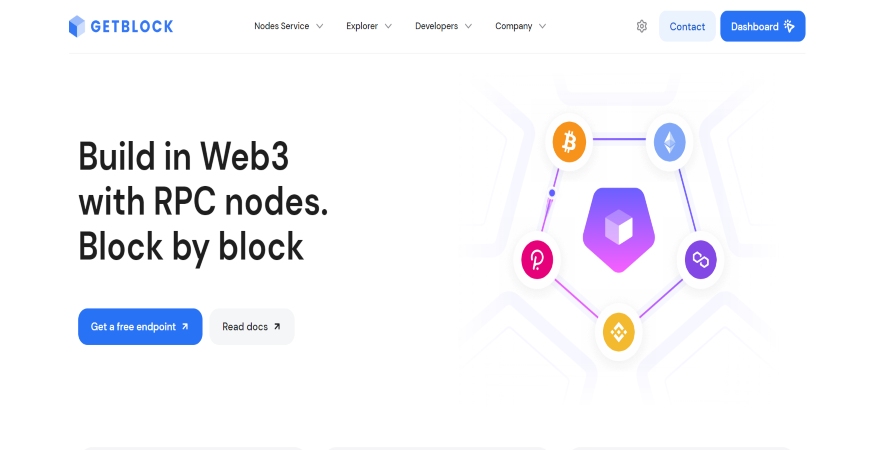
GetBlock is a Web3 RPC (Remote Procedure Call) provider that offers instant access to over 50 blockchain ides protocols. The platform provides a flexible pricing model and is designed to support wallets, NFTs, DeFis, analytics, and trading applications.
Advantages
- Extensive Blockchain Support: Supports a broad range of blockchains, providing flexibility for developers working on multi-chain projects.
- Flexible Pricing: Offers a pay-as-you-go model, making it cost-effective for varying usage levels.
- User-Friendly Interface: Easy to navigate dashboard with comprehensive documentation and fast support response.
Disadvantages
- Performance Variability: Performance varies depending on network load and usage.
- Limited Advanced Features: Lacks some advanced features available in other high-end node providers.
Suitable For
- Developers working on projects that require support for multiple blockchains.
- Developers and startups looking for a flexible and cost-effective solution.
8. Blockdaemon
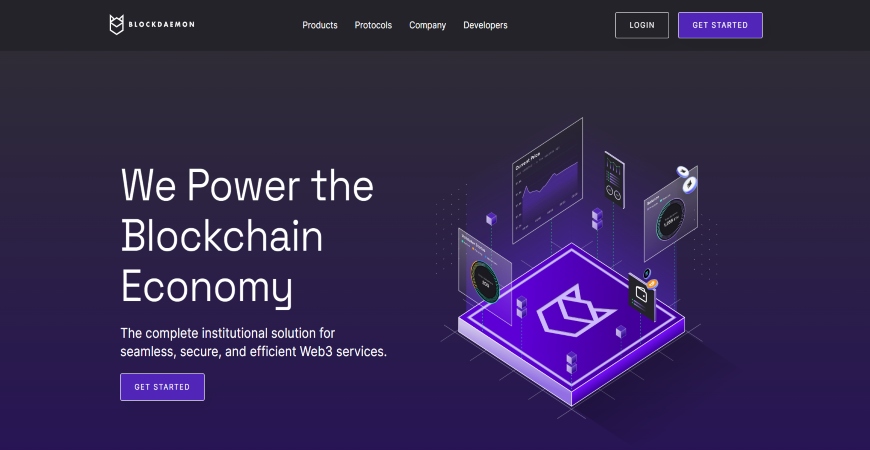
Blockdaemon is a comprehensive blockchain infrastructure management solution, offering wallet, node management, and staking solutions for over 60 networks. Impressively, it boasts a 99.9% uptime, making it trusted amongst many on-chain transaction and staking platforms.
Advantages
- Comprehensive Support: Blockdaemon supports over 60 blockchain networks, including Ethereum, Solana, Polkadot, and Cardano. This extensive support makes it a versatile choice for developers and institutions.
- Enterprise-Grade Security: Offers institutional-grade security with ISO 27001 certification, zero-slashing guarantee, and robust DDoS protection, ensuring the safety of nodes and data.
- Scalability and Flexibility: Provides both cloud and bare metal nodes, allowing for rapid and flexible node deployment with low latency and high performance.
- Dedicated Customer Support: 24/7 customer support with a <24 hour response time for enterprise clients.
Disadvantages
- Cost: Advanced features and institutional-grade services make it expensive, meaning it’s less suitable for small developers or projects with limited budgets.
- Complexity: The range of services and customization options is overwhelming for beginners.
Suitable For
- Organizations requiring a secure, scalable, and compliant infrastructure for large-scale blockchain applications.
- Projects needing support across multiple blockchain networks with high performance and reliability requirements.
9. ANKR
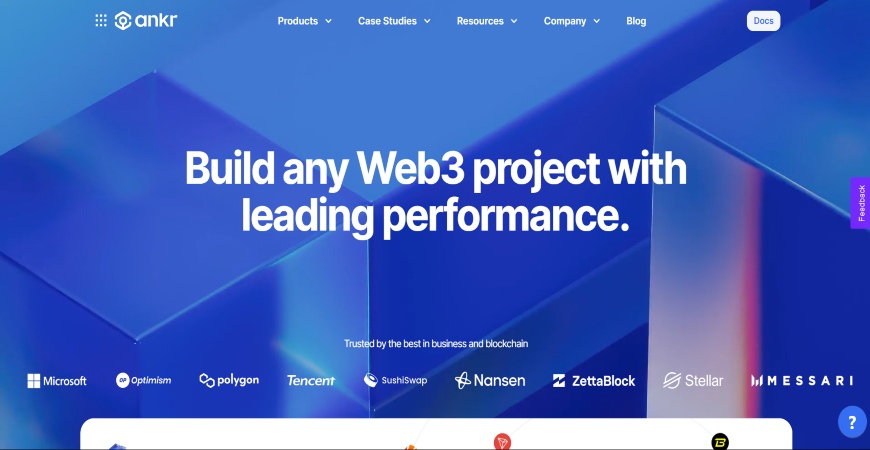
Ankr offers a global node delivery system that caters to over 50 proof-of-stake (PoS) chains. The platform allows node providers to earn its native ANKR token, as well as actively participate in the Ankr DAO.
The flexibility Ankr offers is another significant selling point, as in addition to offering one-click node deployment, it also offers the choice to use either Ankr hardware or your own.
Advantages
- Decentralized Node Network: ANKR provides a decentralized infrastructure, which aligns well with the principles of Web3 and ensures high availability and fault tolerance.
- Extensive Blockchain Support: Supports over 30 blockchain networks, including Ethereum, Binance Smart Chain, and Polygon.
- User-Friendly: Offers an intuitive interface and comprehensive developer resources, making it accessible for both newcomers and experienced developers.
- Additional Services: Features like liquid staking allow users to earn rewards.
Disadvantages
- Limited Advanced Features: Lacks advanced features and customizability in comparison to more centralized or enterprise-focused providers.
Suitable For
- Developers and projects focused on decentralized applications and services.
- Developers looking for cost-effective solutions with a decentralized approach.
10. Tatum
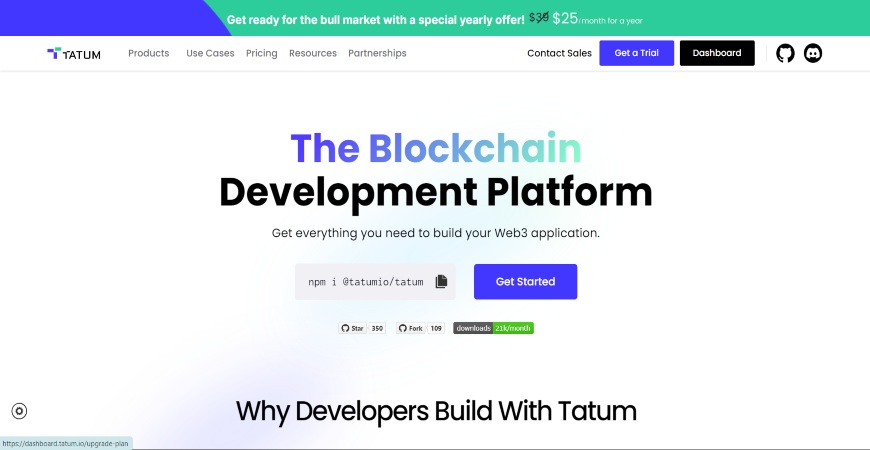
Tatum is another node provider that sports a unified framework that supports over 65 blockchain protocols.
Further, Tatum is known for being developer-friendly, offering an open-source SDK, simplifying transactions, and providing useful features like fee estimation, exchange rates, and Web3 notifications.
Advantages
- API-Driven Development: Simplifies blockchain development with comprehensive APIs that support multiple blockchains, including Ethereum, Bitcoin, and Polygon.
- Ease of Use: Provides tools and resources that make it easy for developers to build and deploy blockchain applications without extensive blockchain expertise.
- Multi-Chain Support: Supports a wide range of blockchain networks, enhancing flexibility for developers working on diverse projects.
Disadvantages
- Limited Customization: Lacks the customization options in which more advanced providers may have.
- Scalability Concerns: Not as focused on enterprise-grade scalability as some other providers.
Suitable For
- Developers looking for straightforward, API-driven blockchain solutions.
- Projects that need to be developed and rapidly deployed with minimal infrastructure management.
11. NowNodes
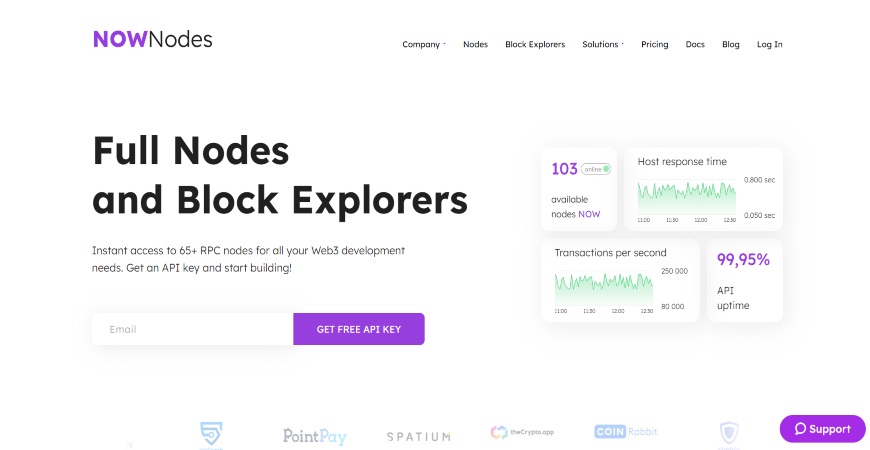
NowNodes provides a Blockchain-as-a-Service model, offering access to full nodes and block explorers via a simple API. It also boasts a high API uptime, as well as supports over 60 blockchain networks.
Advantages
- High Uptime: Guarantees 99.95% uptime, ensuring reliable access to blockchain nodes.
- Customizable Nodes: Offers options for shared and dedicated nodes, providing flexibility based on project requirements.
- Quick Response: Promises less than 24-hour response time for support across all tiers, including free plans.
Disadvantages
- Performance Variability: Shared nodes sometimes experience performance issues under heavy loads.
- Cost for Advanced Features: Its advanced features and dedicated nodes are expensive.
Suitable For
- Developers who require reliable and consistent access to blockchain nodes.
- Projects that need to switch between shared and dedicated node options based on their evolving requirements.
12. Infstones
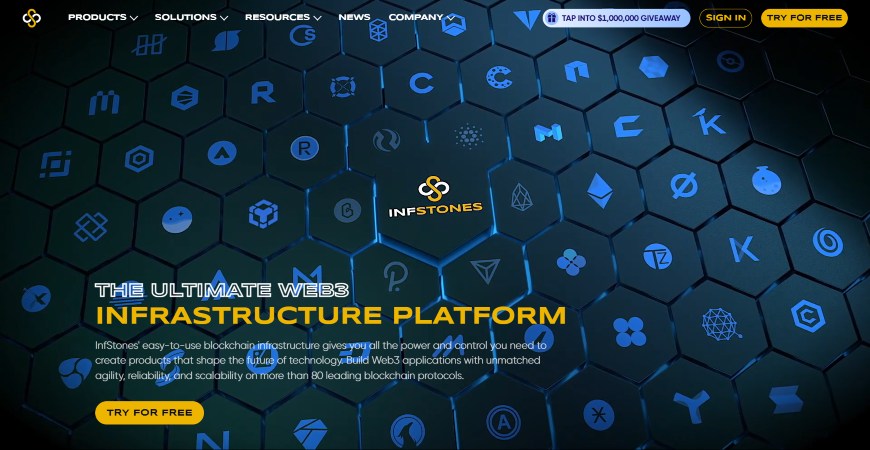
Infstones is another powerful platform that allows for the launching and managing of nodes, staking PoS tokens, and using APIs. It offers services on Oracle and other cloud providers, and connects to over 80 top blockchains.
Advantages
- Ethereum Specialization: Provides specialized support and tools for managing Ethereum-built resources.
- Comprehensive Security: Emphasizes security with features like password protection, IP whitelisting, and advanced API logs.
- User-Friendly Interface: Offers an intuitive interface that simplifies the management of blockchain nodes and resources.
Disadvantages
- Niche Focus: While strong in Ethereum, Infstones doesn’t offer the same level of support for other blockchains.
- Cost: Advanced security features and specialized services can become costly.
Suitable For
- Developers and businesses building on Ethereum.
- Projects that prioritize security and in-depth monitoring.
13. Pokt Network
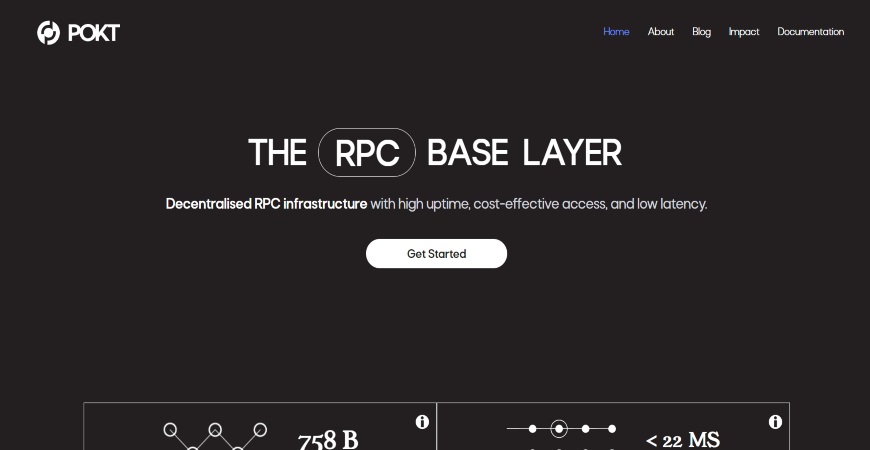
Pokt Network offers a decentralized RPC layer that promises high uptime, cost-effective access, and low latency. It also has a unique governance model that empowers network participants through a DAO which incentivizes running RPC nodes across various blockchains.
Advantages
- Decentralized API: Operates through a network of decentralized nodes, enhancing reliability and reducing single points of failure.
- Wide Blockchain Support: Supports numerous blockchains, including Ethereum, Binance Smart Chain, and Solana, offering flexibility for developers.
- Crypto-Economic Model: Allows developers to stake POKT tokens for accessing network services.
Disadvantages
- Reliability Concerns: Its decentralized nature can lead to variability in node performance and reliability.
- Complexity: The staking model introduces complexity for new users.
Suitable For
- Developers looking to leverage staking for network access and rewards.
14. WatchData
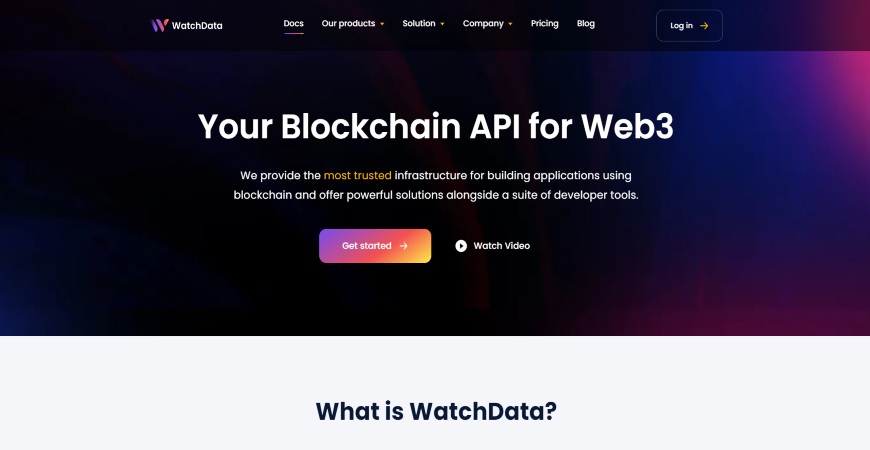
WatchData manages several private nodes for various blockchains, ensuring real-time syncing, high availability, ease of use, and data integrity.
Trusted by the community, the platform has reportedly facilitated over 100 million requests and over $850 million worth of on-chain transactions since its launch.
Advantages
- Easy Data Access: Provides streamlined access to blockchain data through APIs, facilitating the development of decentralized applications.
- Comprehensive Support: Offers detailed documentation and responsive support, aiding developers throughout their project lifecycle.
- Integration Capabilities: Seamlessly integrates with various blockchain networks, simplifying the development process.
Disadvantages
- Feature Limitations: Hosts a limited amount of features which may only be sufficient for beginners.
- Performance Issues: Performance varies under heavy load.
Suitable For
- Projects that require easy and reliable access to blockchain data.
- Developers looking for straightforward integrations with blockchain networks.
15. NodeReal
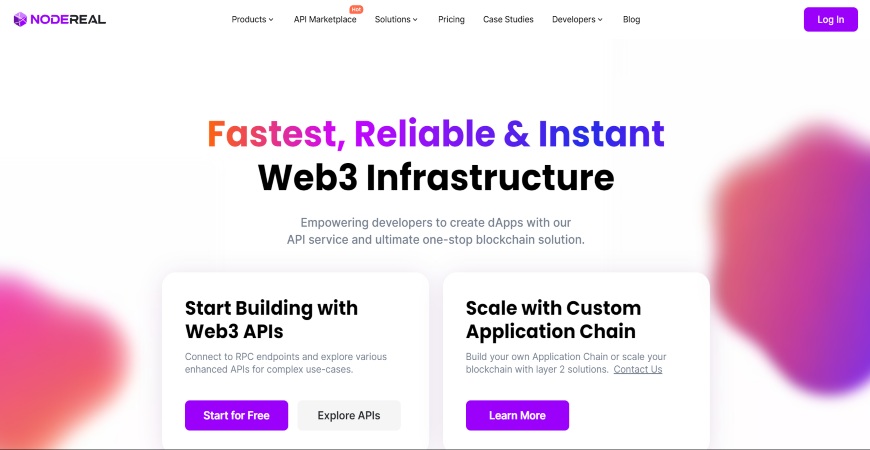
And finally we have Nodereal, which focuses on providing high-performance blockchain node services through ensuring fast transaction processing and low latency. It also supports a wide range of blockchain networks and offers a comprehensive suite of APIs, making it suitable for large-scale operations.
Advantages
- High Performance: Emphasizes high-speed, low-latency node operations, ensuring fast transaction processing and reliable access.
- Scalability: Designed to handle high volumes of transactions, making it suitable for large-scale applications.
- Comprehensive API Suite: Offers a wide range of APIs which support various blockchain functionalities, enhancing the developer experience.
Disadvantages
- Cost: Advanced performance features and scalability options come at a higher cost.
- Learning Curve: Has a steeper learning curve for new users due to its advanced features and capabilities.
Suitable For
- Projects that require fast and reliable transaction processing.
- Developers who need a comprehensive suite of APIs for complex blockchain functionalities.
Ethereum Node Providers
Ethereum node providers, as the name suggests, allow individuals and businesses to interact with the Ethereum blockchain without the need to set up and maintain their own nodes.
These types of providers often offer a range of services, including API access to the Ethereum network, which is crucial for developers building decentralized applications (dApps).
Below are top 3 Ethereum node providers in the above list:
- Alchemy – Known for its high reliability and suite of development tools, Alchemy supports Ethereum along with other blockchains.
- Infura – Offers core node services, and is integrated with Consensys products, making it a popular choice for Ethereum developers. For context, Consensys is the development house behind the Ethereum blockchain.
- Chainstack – Offers a global architecture with a transparent pricing model and strong support for Ethereum nodes.
How Do I Choose A Blockchain Node Provider?
Consider the following features before deciding which blockchain node provider to opt for.
Supported Blockchain Networks
Different node providers support different blockchain networks, meaning it’s vital to research this beforehand.
Pricing Plans and Cost Efficiency
Pricing models vary significantly. For example, Infura offers a free plan with a limit of 100,000 requests per day, as well as paid plans starting at $50 per month. Alternatively, some providers like GetBlock have a pay-as-you-go model.
With this in mind, consider your budget and the scalability of pricing models in order to avoid unexpected costs.
API Features and Tools
The range of APIs and development tools available can greatly affect the ease of integration and development speed. Alchemy, for example, offers a variety of APIs including NFT API, Token API, and Debug API. Moralis, on the other hand, provides an API-powered dashboard for serverless applications and a software development kit (SDK).
Customization and Flexibility
Customization options, such as those offered by Chainstack (custom node parameters and optimizations) and Nownodes (shared and dedicated nodes), can be vital for tailoring the node services to specific project needs.
Reliability and Uptime
High uptime guarantees are essential for maintaining service continuity. For example, providers like Nownodes offer a 99.95% uptime guarantee.
Security Features
Keep in mind that different node providers offer different security features. For example, Infstones offers API security with password protection, whitelists, and dedicated IP addresses.
Support and Documentation
Quality of support and the availability of comprehensive documentation can also significantly ease the development process. For instance, providers that offer detailed technical guides are usually more helpful when resolving issues, as they may not require you to connect with their customer service team.
Performance and Speed
Performance metrics like response time are crucial. Quicknode, for example, claims a 65% better speed compared to competitors, which can be a decisive factor for applications requiring fast transaction processing.
Client Base and Reputation
While not always true, the existing client base and reputation of a provider can offer insights into reliability and service quality. Alchemy, for example, has some very high-profile clients like Aave, OpenSea, Meta, and Adobe, which speaks volumes about its reputation.
Top 15 Blockchain Node Providers – FAQs
Which blockchain has the most nodes?
Bitcoin has the most nodes, with over 15,000 active nodes running worldwide. This large number of nodes contributes to the network’s strong security and decentralization.
Is running a blockchain node profitable?
Running a standard blockchain node like a Bitcoin full node doesn't directly earn you money. However, running specialized nodes like a Lightning node can be profitable as they can earn transaction fees for processing payments. However that being said, profitability can vary based on several factors, including the cost of electricity and hardware in your region, as well as overall network demand.
What are the main benefits of using a node provider?
The main benefits of using a node provider include cost efficiency, scalability, reliability, security, and ease of use. In essence, node providers should allow users to focus on their core activities without managing complex node infrastructures.
Can I switch between node providers easily?
Yes, most node providers offer flexible services that allow you to switch between providers with minimal disruption. Just make sure you choose providers that support easy migration.
Are there any free node providers?
Yes, of course, many node providers offer free tiers with limited features and usage. Quicknode, Alchemy, and Infura are notable examples of platforms that provide free plans.
 Never miss an Update!
Never miss an Update!  Top Cryptos to buy?
Top Cryptos to buy?







